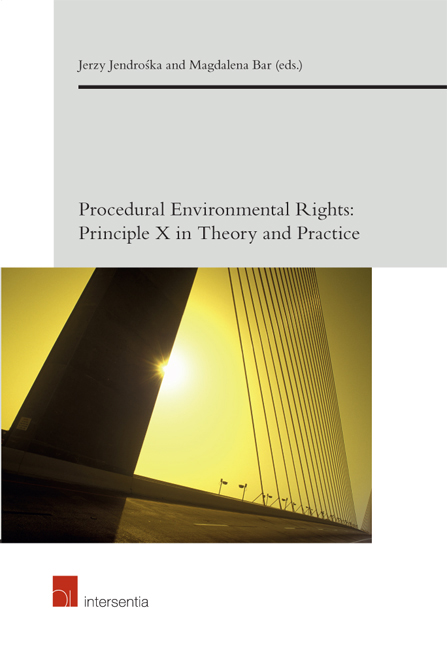Book contents
- Frontmatter
- Contents
- Introduction Procedural Environmental Rights in Theory and Practice
- Procedural Environmental Rights: Status and Developments
- Procedural Environmental Rights in Practice
- Public Participation
- Access to Justice
- Procedural Environmental Rights and Nature Protection
- Procedural Environmental Rights and EIA
- Procedural Environmental Rights and Climate Change
- (Un)comfortably Numb: The Role of National Courts for Access to Justice in Climate Matters
- Access to Information, the Hidden Human Rights Touch of the Paris Agreement?
(Un)comfortably Numb: The Role of National Courts for Access to Justice in Climate Matters
from Procedural Environmental Rights and Climate Change
Published online by Cambridge University Press: 12 October 2018
- Frontmatter
- Contents
- Introduction Procedural Environmental Rights in Theory and Practice
- Procedural Environmental Rights: Status and Developments
- Procedural Environmental Rights in Practice
- Public Participation
- Access to Justice
- Procedural Environmental Rights and Nature Protection
- Procedural Environmental Rights and EIA
- Procedural Environmental Rights and Climate Change
- (Un)comfortably Numb: The Role of National Courts for Access to Justice in Climate Matters
- Access to Information, the Hidden Human Rights Touch of the Paris Agreement?
Summary
“A Karachi lawyer (…), questioned about access to environmental justice, dryly remarked that in the city there was no environment, no justice and no access to either.”
Martin Lau, Access to Environmental Justice:
Karachi's Urban Poor and the Law, 2007, p. 178.
ABSTRACT
Principle 10 of the Rio Declaration brought about the proceduralisation of environmental rights, but did not warrant the fulfillment of the right to access justice in environmental matters. Such void is all the more perceived at a time when the pressing nature of climate change is prompting individuals and NGOs to take action in courts. Albeit absent from the international climate change treaty regime, access to justice now appears to be emerging in national climate change cases.
In light of a new strand of cases decided as of 2015, I argue that domestic courts are increasingly applying international norms in order to allow individuals and NGOs to access justice in climate change matters. I conclusively hold that such a mechanism not only adheres to Principle 10 of the Rio Declaration, but it may also boost the enforcement of international law and its legitimacy, notwithstanding a number of challenges.
KEYWORDS
Climate litigation; Enforcement; Legitimacy; Paris Agreement; Principle 10 Rio Declaration
INTRODUCTION
Given the almost universal consensus on the Paris Agreement, as well as its entry into force, implementation has now become the most pressing legal challenge in addressing the threats and opportunities of climate change. Civil society organizations have consistently taken part in climate change negotiations ever since the 1992 UN Conference on Environment and Development (also called ‘Earth Summit’), yet a novel tactic of mounting pressure has lately appeared at an unprecedented rate. Namely, climate change litigation, by which individuals and NGOs require national adjudicating bodies to hold governments accountable for damages and/or mounting threats to individuals, the climate and the environment at large. The limelight seems to have expanded from public participation in the ambit of Conferences of the Parties and informal meetings to national courts and national human rights bodies compelling governments to abide by their obligations.
Besides public participation, a further element of climate change matters is worth considering. The decisive conundrum of enforcement is still relevant.
- Type
- Chapter
- Information
- Procedural Environmental RightsPrinciple X in Theory and Practice, pp. 437 - 464Publisher: IntersentiaPrint publication year: 2018
- 3
- Cited by



